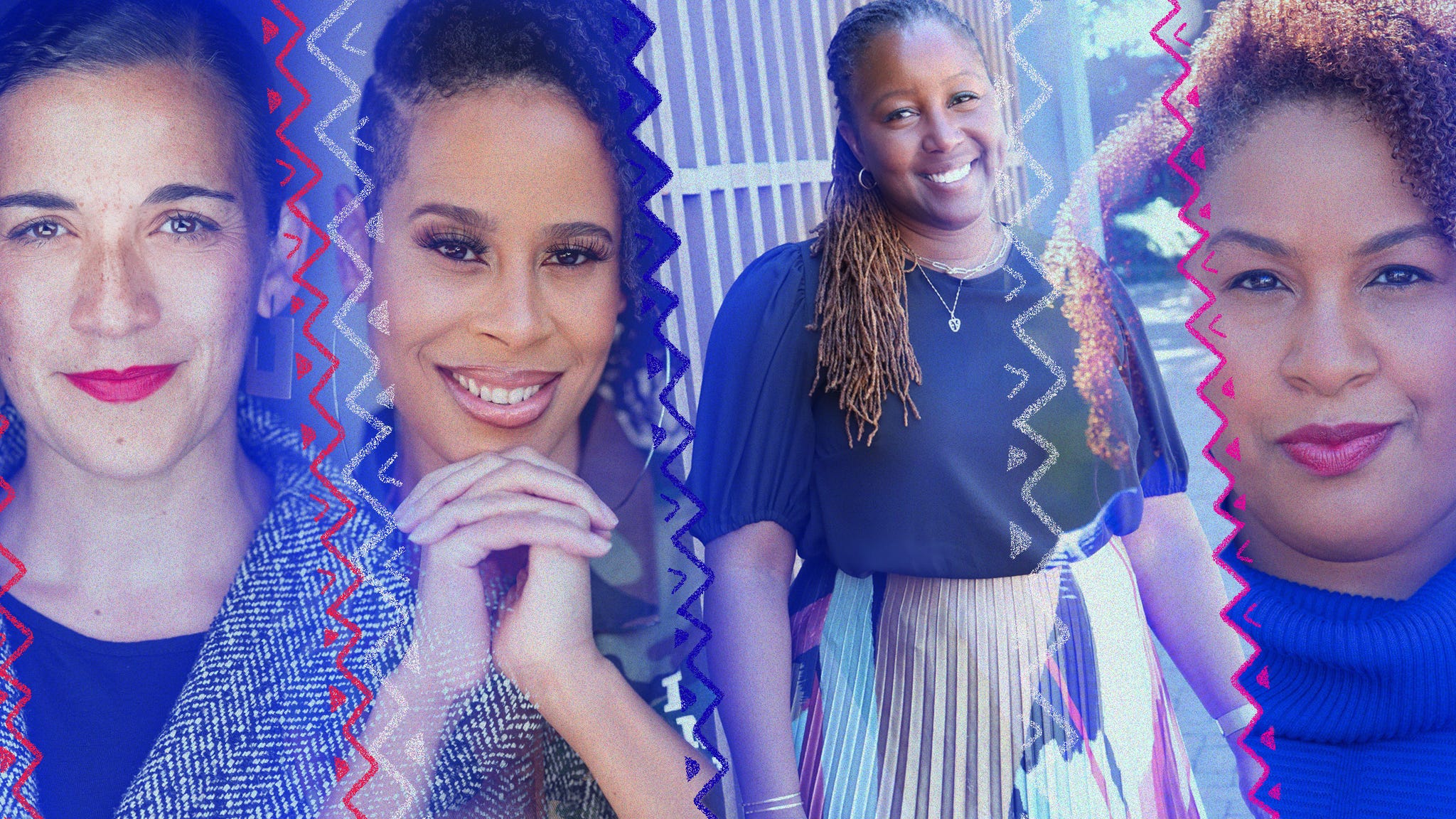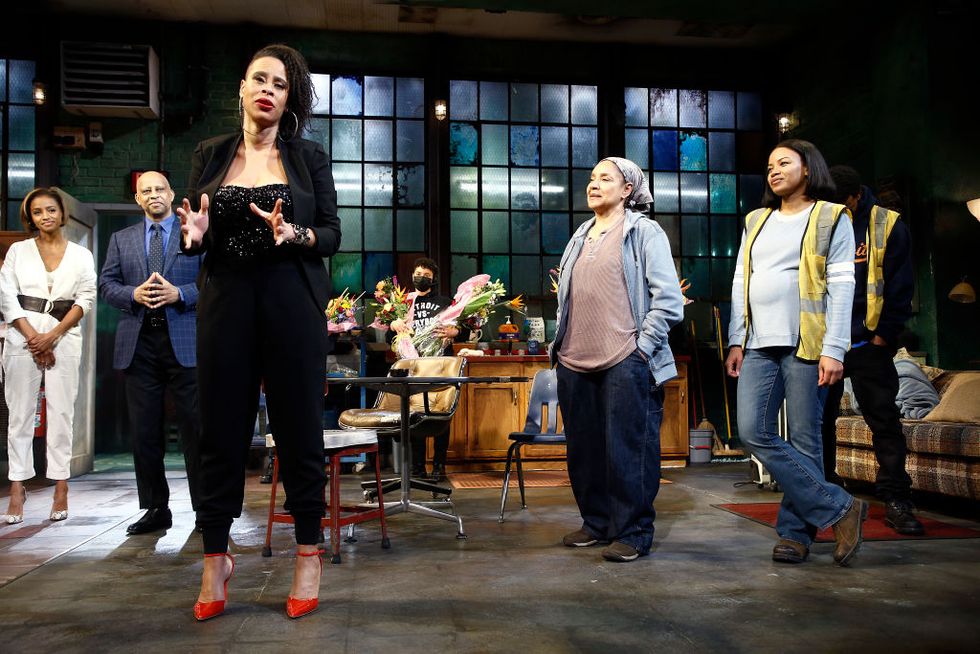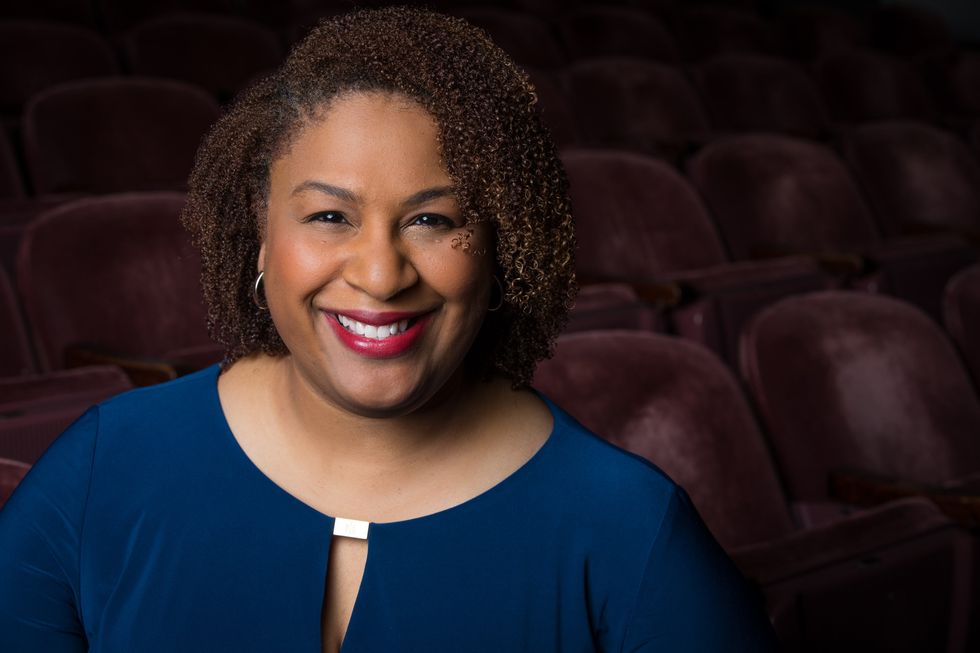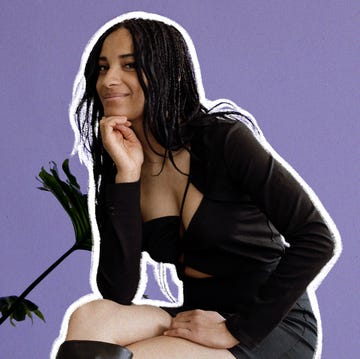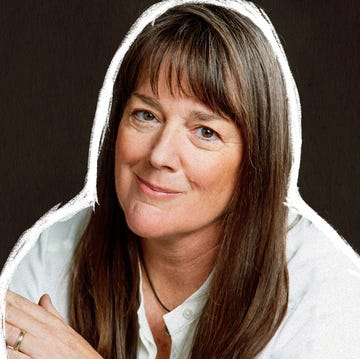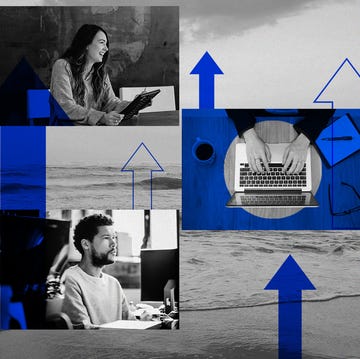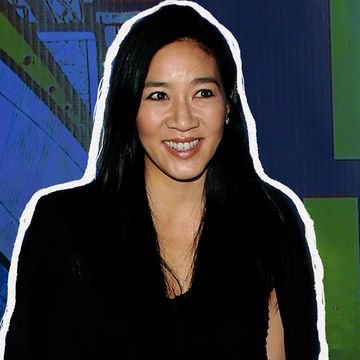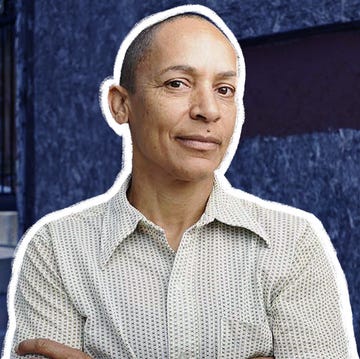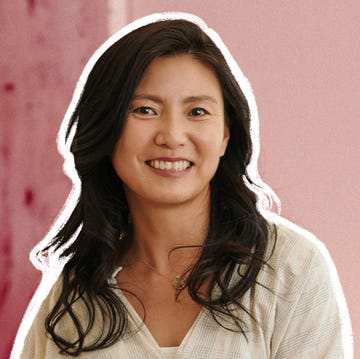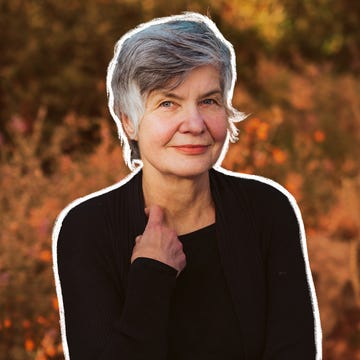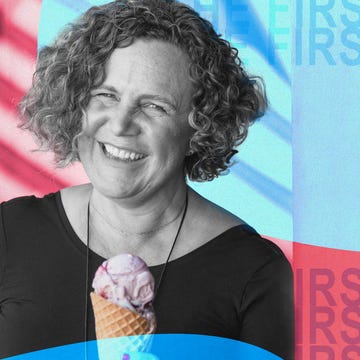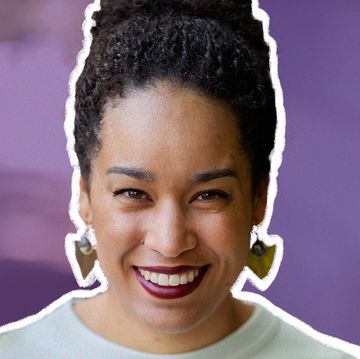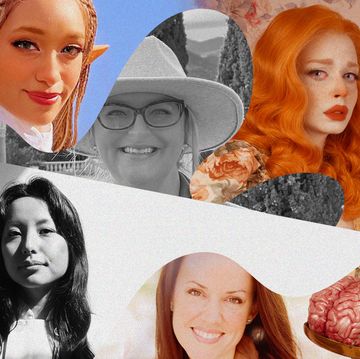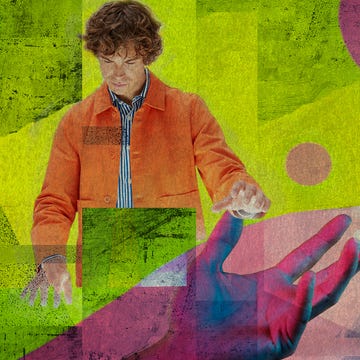As some of the first and few Black women at the helm of theater institutions across the country, Nataki Garrett, Patricia McGregor, Dominique Morisseau, and Hana Sharif are making history. They are also facing massive obstacles like “white flight” of donors, and in one case, a death threat.
Garrett is the first Black female artistic director in the Oregon Shakespeare Festival’s (OSF) 88-year history. Her leadership guided the organization through numerous transitions and crises, all while working toward a more sustainable producing and fundraising model following the pandemic. She raised $6 million for the company and secured $8 million for the state’s performing arts organizations.
In her first three months on the job in 2019 in Ashland, Oregon, whose population is about 91 percent white according to the 2020 census, she was called “Black bitch” and followed home. “Resilience requires harm,” Garrett tells Shondaland. “If we are becoming more and more resilient, it’s because that is consistently connected to the harm that we receive.”
The artistic director was forced to relocate her family. Later, OSF hired a private security detail to ensure Garrett’s safety when taking walks in public. While the incidents upended her life and, at first, pushed her to isolate, through an outpouring of support and her own desire to make a lasting change to create less-oppressive spaces for future generations, Garrett’s devotion to the equity work in theater continues.
“I don’t think I’ve ever been more harmed than I’ve been as a leader in the American theater,” Garrett says. “I think part of it is that I have the audacity to perceive that the ideas in my head are just as valuable, important, and impactful.”
She continues, "I do expect that the pushback is going to be as mighty as my push forward. I long to create a space in which resilience is not part of the equation.”
Sharif, who is Garrett’s colleague and friend, had similar experiences. After a nationwide search, the playwright, director, and producer was appointed as the artistic director of the Repertory Theatre of St. Louis and also experienced verbal assaults. Despite experiencing racism, she’s programming shows with new American voices representing a variety of theater artists and patrons, in addition to directing plays like Pride and Prejudice and an upcoming version of Agatha Christie’s Murder on the Orient Express. Sharif is also a founding member of the Black Theatre Commons, a network of theater practitioners who gather resources to amplify, nurture, and support the work of Black artists through advocacy, convening, networking, and knowledge sharing.
“The level of excellence that came in, particularly for women of color, is because of how hard we’ve had to work to be in this business that was not built for us,” Sharif says. “You’re trying to save a machine that’s also trying to eat you.”
Last year, McGregor took over as the artistic director of New York Theatre Workshop, where popular musicals like Rent, Hadestown, Once, and Slave Play were born. This shift marked what American Theatre magazine described as “one of the most significant artistic turnovers in recent years.” When McGregor assumed her role, like Garrett and Sharif, she became one of only a handful of Black women serving as artistic directors in the country.
“I met with somebody last week who said, ‘Well, who were you contracted to bring in with you when you came in?’” McGregor recalls. “And I said, ‘I didn’t even know to ask for that.’ There is a great deal of that as we come into these positions and we’re often the first one.”
Morisseau, a MacArthur Fellowship recipient and Tony-nominated playwright behind the Temptations musical Ain’t Too Proud and Skeleton Crew, is also making waves as executive artistic producer at Detroit Public Theatre. Her newest play, Confederates, currently running at Sharif’s theater, is about an enslaved rebel turned Union spy and a tenured professor having parallel experiences of institutionalized racism existing more than a century apart.
“Everybody here was something else,” Morisseau says. “They’re artists and directors rising to the occasion because they’re needed, and they’re answering the call of duty to service their field and to service the world at large.”
Inclusivity in the theater world remains overdue. In the 2018-2019 Visibility Report conducted by the Asian American Performers Action Coalition, research found that in the 2018-2019 theater season, 100 percent of artistic directors at the largest nonprofit theater organizations were white, 93.8 percent of all Broadway directors were white, and 93.6 percent of Broadway producers were white.
Despite their challenges, the women are proving that theater is a powerful tool for change with the support of one another. By hiring more people of color, advocating for better labor practices, fighting for funding, and choosing a wider array of stories — from classics by Shakespeare and Austen re-envisioned with actors of color to new works written and directed by people of color — these women are making theater more accessible to wider audiences. The women recently spoke with Shondaland to discuss how they’re disrupting the industry and why change was needed.
MIA BRABHAM: What drew you to the theater?
PATRICIA McGREGOR: It’s for moments like these where, even though this is digital, you can gather people you love to tell stories that are beautiful and complex to feel the DNA of the way the human experience impacts someone and the reverberation in the audience. Right now, we are an audience of five, but you can feel the molecular change in a way that’s incredibly moving, that cannot be automated and digitized. It allows for us to move through our humanity. It honors the community. And it really fights social isolation. I feel that the communal aspect of it is vital.
NATAKI GARRETT: I got bit by the bug when I was 13. Initially, it was a space that I found to be more welcoming than any other space that I was entering. Of course, later on, you look back, and you go, “That wasn’t really welcoming at all.” But at the time, it was. It felt like I could play and use my imagination and have experiences that were connected to the moment that we are in right now. There was a feeling about being present.
DOMINIQUE MORISSEAU: I started as an actor and then as a playwright to give more voice to myself as an actor and to just give voice to stories. I work in television and film, and they’d never replace theater. The theater reminds you — forces you, even — to be a storyteller. To have people play make-believe inside of your house is awesome. I don’t know that there’s any place else on Earth that allows you to play, be childlike, and have your imagination conjured in front of your face live like theater.
HANA SHARIF: I came to theater as a writer first. It was how I began the ritual of understanding myself in the world. When I had questions that needed answering, I found the answers to those questions through the process of writing — writing it into existence and then building a world where it could happen. When I graduated from college, I felt that theater was stronger than the law as a way to change the world. And there’s some piece of me that still believes that.
MB: As the first Black women at the helm of these historically white institutions, what are the challenges you face, and how do you overcome them?
NG: You take it as it comes. As women leaders, there’s a tendency for the powers that be to seek ways to cut us off and push us out. The first way, of course, is fiscally. What they’ve failed to understand about us as Black women is that we’ve had to be malleable, evolve, shape-shift, and be chameleons the whole time. As things have moved against me, my experience is that there’s always another way and adaptation that I can take hold of and move myself through whatever that problem is. Because I was built that way. We’ve been ready. What’s new is not us. What’s new is the industry and their ability to adapt to us.
PM: One of the particular challenges of this moment is that many of us are taking on leadership in one of the deepest times of crisis in our field. We have great vision, and there is a sometimes real, weaponized naming of the financial frailty. There is, at times, discomfort and figuring out how not to feel isolated in it as we try and move things forward. As we come into these positions, we’re often the first one. I’m thinking a lot [about] how we go into spaces not alone.
HS: There’s something magical and powerful about the possibilities of what happens if we get it right, and what it means for the next two, three, five generations. I don’t think any of us are in these jobs just for ourselves. At this point, it’s holding space for the generations coming behind us. We know what it took for us to get here and how many Black women sacrificed and didn’t make it through the glass ceiling so that [we] could. The collective responsibility we have keeps me motivated when the days are hard and the people whose jobs I’m saving are also less than grateful for the sacrifices.
DM: My appointment literally came from a sense of empowerment and not even asking them but demanding a different type of representation happening inside of these institutions. I could no longer be an advocate, a supporter, and a fundraiser for an institution that was using my name in my own city and wasn’t going to have any leadership at the highest level that reflected the majority of my city. For me, my appointment is not any kind of aspiration other than just trying to fill in this gap in this moment to help turn the tide for this institution.
MB: Why is reimagining classics with the Black perspective important?
HS: When I started to focus on doing classics, it was with great intention of breaking through the glass ceiling. At that time, most Black directors were only hired to direct Black work. But I also knew if I wanted to run one of these large-scale regional theaters, that is how they kept us locked out. Part of it was to be able to take that argument off the table when it comes to looking at me as a potential leader of a theater. Not only can I direct those classics, but I can do it dancing backwards with heels on.
You can take those heightened metrics of what people think great theater is and that it doesn’t exclude me, but it actually can center me and hold all of me. Part of it for me is about taking very well-known stories that attract everyone into the theater and reimagining them in a way that when you enter my theater, you see yourself wholly. You don’t see yourself commodified. But we are looking at your whole humanity through a lens that someone has already told us is excellent and familiar.
NG: I have a responsibility to make sure that young people recognize, “I have access to Shakespeare [and] Dominique Morisseau.” I believe that both of these voices are emblematic of making sure that we understand something about our past, present, and future. In my space, you lift both up equally.
MB: What do you want people to know about the work you do?
NG: It’s crucial and important to the future of the entertainment industry that we stop living in a world in which [people are] surprised that we’re here. We’ve been here the whole time. We are the ones that still remain to help evolve the work. I long for a space in which it is normative to experience us and all people of color, but Black people in particular.
DM: I really want to see the people who I’m telling stories about show up and hear those stories. The thing I would like to leave with people is that we know more than you think we do. Take us and what we have to say seriously. Give us time and resources, and respect the authority of our voices.
PM: I want future generations and our daughters and children to see us and assume that we are here. There will be liberation in that, not to feel like we have to struggle so hard to be the first one.
MB: How can allies and audiences support you?
NG: I think our allies, bystanders, and upstanders can be activated by their own desire to live in a world in which they have access to the expertise and the genius of Black women in leadership, and when they believe that that is actually something that is the most beneficial part of their engagement with us.
I need them to be active in the understanding that if I’m here at the helm of this theater, at one of the largest, most heavily resourced theaters in the United States, it’s because everything that I did before created the opportunity. Myself, my talent, and my training brought me here. It wasn’t an anomaly [or] a miracle. It was an intention.
PM: For all of the training and all of the things people have gone to, people don’t want to admit when it’s them. Disrupting white supremacy is a core value of where we are. I often ask, “How does that show up? What does that mean to you?” It’s figuring out who’s willing to do the work to say, “This is how it’s showing up now.” Who’s going to be able to have that self-reflection? The harder work is not overt, but [in] the much more internalized places.
DM: In order to be fair, whether it’s your marketing team or whomever, you’ve got to invest, research, and get to know us. Don’t try to get in front of me if you’re my ally. Don’t try to co-opt or take over the movement. Show up for us by getting in line with us and not ahead of us or in opposition of us.
This interview has been edited for length and clarity.
Mia Brabham is a staff writer at Shondaland. Follow her on Twitter at @hotmessmia.
Get Shondaland directly in your inbox: SUBSCRIBE TODAY
